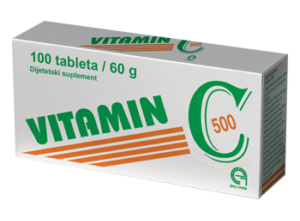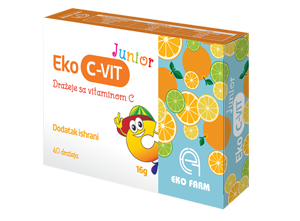What is vitamin C?
Vitamin C or L-ascorbic acid is a water-soluble vitamin that is necessary for normal growth and development of the human body. It is an essential nutrient, which means that it cannot be synthesized by the body and must be provided continuously through a healthy diet. Raw fruits and vegetables are the best natural sources of vitamin C. Highest amounts can be found in papaya, kiwi fruit, citrus fruits (orange, lemon, grapefruit, clementine), strawberries, raspberries, pineapple, broccoli, red peppers, cabbage, brussels sprouts, cauliflower, potatoes and tomatoes. Other sources of vitamin C are dietary supplements and fortified foods and beverages (breads, grains, cereal, fruit juices, dairy products). Vitamin C is highly labile and its content in foods can be affected by cooking, prolonged storage, oxygen and light exposure. Intestinal absorption of vitamin C is dose-dependent, which causes conservation in the body during periods of low intake and increased urine excretion at high intakes.
Biological activity
Vitamin C is involved in crucial metabolic pathways that contribute in maintaining body’s vitality and natural defence mechanisms. It is required for the biosynthesis of collagen, which is the main structural protein of various connective tissues, such as tendons, ligaments, cartilage, bones, skin, blood vessels, corneas and dentin. Another important role of vitamin C is its ability to protect the body from oxidative stress caused by free radicals. Large number of studies have established a link between oxidative stress and many human diseases, including stroke, coronary heart disease, neurodegenerative diseases and even cancer. Adequate intake of vitamin C is found to improve components of the human immune system, which may shorten the symptoms and duration of upper respiratory tract infections. Vitamin C enhances non-haem iron absorption and is a common compound in iron dietary supplements.
Therapeutic uses
Results of numerous scientific studies on whether vitamin C is helpful for preventing various health conditions remain inconclusive. However, some evidence shows that people who get enough vitamin C from a healthy diet, as well as dietary supplements, are less likely to be diagnosed with heart attack, stroke, peripheral artery disease, hypertension, macular degeneration, asthma, immune system deficiencies and some types of cancer.
Conditions that require vitamin C supplementation include:
- rapid growth and development in children and adolescents
- great physical strain
- frequent upper respiratory tract infections
- fever
- iron deficiency anemia
- pregnancy and lactation
- smoking
- inadequate intake during reduction diets
- intestinal malabsorbtion in elderly
Deficiency
Vitamin C deficiency, also known as scurvy, is fairly uncommon in developed countries and it is primarily associated with inadequate diet. Some population groups, such as infants aged 6-12 months, the elderly, chronic patients, pregnant and lactating women, smokers and alcoholics are all at higher risk of developing deficiency. Early symptoms are usually visible after one month of vitamin C depletion and they include fatigue, irritability, joint and muscle pains and easy bruising. Severe deficiency symptoms appear after approximately three months and they include various hemorrhagic manifestations (bleeding gums, petechiae, internal bleeding), loose teeth, poor wound healing, recurrent infections, lower extremity edema and abnormal bone and dentine formation. Fortunately, scurvy is successfully treated with oral vitamin C supplements in combination with well-balanced vitamin C rich diet. Patients respond quickly to the therapy and witness milder symptoms improvement within just 48 hours. Hemorrhagic manifestations usually improve within next 2 weeks. Complete recovery typically occurs after 3 months of supplementation. If left untreated, scurvy can lead to severe health complications and death.
Hypervitaminosis
Vitamin C hypervitaminosis is rare, due to its water solubility, which means that every excess dietary intake of vitamin C will be excreted in the urine. However, toxic levels of vitamins can be reached, more likely through high intake of fortified foods and dietary supplements, than from natural food sources. Therefore, it is very important to strictly follow the recommended dosing guidelines. The upper limit for vitamin C intake for healthy adults is 2000mg/day. Taking higher doses may acidify the urine and cause severe nausea, diarrhea and gastritis. It may also contribute to the formation of kidney stones and promote iron overload in patients with haemochromatosis. Daily intake up to 1000mg of vitamin C is generally regarded as safe and does not have toxic effects in healthy adults.
Recommendations
Recommendations for vitamin C intake have been set by various national agencies. According to European Commission’s Council on nutrition labeling, Recommended Dietary Allowances (RDA) for vitamin C for healthy adults is 80mg per day.
However, using higher amounts than the RDA levels is recommended in various conditions:
- frequent infections of upper respiratory tract
- rapid growth in children and adolescents
- great physical strain
- wound healing process
- pregnancy
- lactation
- smoking
Possible side effects and drug interactions
Although it is generally regarded as safe if taken in recommended doses, vitamin C may cause unwanted side effects, including diarrhea, nausea, vomiting, abdominal cramps, heartburn, skin rashes and headache. People suffering from conditions like haemochromatosis, glucose-6-phosphate dehydrogenase deficiency and oxalate kidney stones should avoid megadoses of vitamin C, since they can develop severe side effects.
Vitamin C may interact with the following medications: aspirin, paracetamol, ampicillin, tetracyclines, aluminum-containing antacids, warfarin, phenothiazines, barbiturates, epinephrine, oral contraceptives and nicotine products. People who are being treated with any of these medications should use vitamin C dietary supplements only under a doctor’s supervision.
by: mr ph Iva Majstorović, posted on November 7, 2014
 Vitamin C-500 is a dietary supplement based on vitamin C, which is essential for improving vitality of our body and it’s natural defense mechanisms. Without sufficient amount of this vitamin many physiological functions, such as growth and development, or antioxidant defense, would simply not be possible. It is an essential nutrient, which means that it cannot be synthesized by the body, therefore, it must be provided continuously through a healthy diet and dietary supplements, when necessary.
Vitamin C-500 is a dietary supplement based on vitamin C, which is essential for improving vitality of our body and it’s natural defense mechanisms. Without sufficient amount of this vitamin many physiological functions, such as growth and development, or antioxidant defense, would simply not be possible. It is an essential nutrient, which means that it cannot be synthesized by the body, therefore, it must be provided continuously through a healthy diet and dietary supplements, when necessary.
 Eko C-Vit junior is a dietary supplement based on vitamin C, that is recommended for preschool, and school-age children. It contains the recommended vitamin C dose of 50 mg, which meets the children’s daily needs for this vitamin. Tablets are coated with sugar, and 100% natural orange flavor, which makes them easily acceptable for the kids – even for those with the most demanding taste.
Eko C-Vit junior is a dietary supplement based on vitamin C, that is recommended for preschool, and school-age children. It contains the recommended vitamin C dose of 50 mg, which meets the children’s daily needs for this vitamin. Tablets are coated with sugar, and 100% natural orange flavor, which makes them easily acceptable for the kids – even for those with the most demanding taste.
